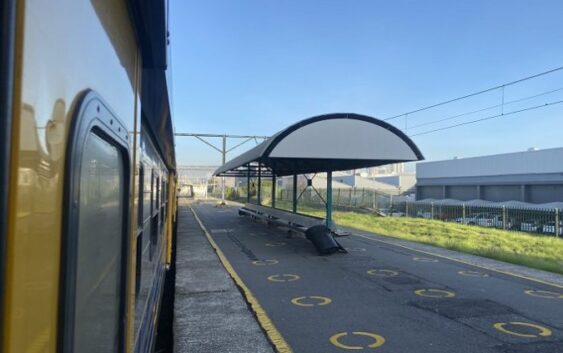- EMZOR TO CONSTRUCT US$$23M API FACILITY IN NIGERIA
- TANZANIA PRESIDENT ANNOUNCED CONTRIBUTION OF TZS100MILLION FOR ARUSHA CHURCH CONSTRUCTION
- KITGUM-KIDEPO ROAD UPGRADE: UGANDA PARLIAMENT APPROVED SHs450BILLION LOAN
- GPA ANNOUNCED PLANS TO BUILD SECOND LANDER BRIDGE IN THE GAMBIA
- HOW CAMEROON AVIATION SAFETY KEEPS IMPROVING BUT FALLING SHORT OF INTERNATIONAL STANDARD
RAIL SERVICE OPERATION RESUME FROM LANGA TO NYANGA IN SOUTH AFRICA

After more than three years, commuters in Cape Town can once again board the trains between Langa and Nyanga following the resumption of the rail service.
The commuter rail service, which offers the most affordable mode of public transport, was closed for more than three years due to the vandalism of public assets and the illegal occupation of the line during the COVID-19 lockdown.
“Restoring passenger rail services in the country is a key priority that will put us back on a path towards the realization of our long-term objective of positioning passenger rail as the backbone of our public transport system,” Minister of Transport Sindisiwe Chikunga said on Tuesday.
She made these remarks after she took a train ride from Nyanga to Cape Town station to assess the work done to recover the rail infrastructure and stations on the Central Line.
Work to recover the Langa to Nyanga included re-railing between Bonteheuwel and Heideveld, replacing sleepers that support tracks between Langa and Pinelands, replenishing ballasts on the Khayelitsha line, and replacing 100 000 fasteners and clips that keep the rails intact.
A total of 7.5 kilometers of overhead equipment that was vandalised has since been replaced.
The recovery of the first Phase of the Langa to Nyanga commuter rail service was completed last month. The Central Line spans over 50 kilometers.
In 2011, the line moved more than 58 million commuters a year, making it the largest rail corridor in the Cape Metro.
In 2021, the Passenger Rail Agency of South Africa (PRASA) set out to recover and restore services in key high-volume corridors that were vandalized.
By December 2022, PRASA had restored 13 corridors. To date, 16 corridors have been recovered, with the latest being the Pretoria to Centurion line that was launched in the past week.
“The recovery of the Central Line is being undertaken in phases. This phased approach allows PRASA to rebuild, and restore train services while the process for the relocation of the illegal occupants on the rail line, and reserve is being finalized.
“Phases 1A, Cape Town to Langa via Pinelands and Phase 1B, Langa to Bellville via Sarepta were completed in July 2022. Numerous oversight visits in the province were conducted by my predecessor and the work continues under my leadership and guidance.
“A lot of work has gone into recovering phases 1A and 1B which included Perway (rail tracks), the replacement of 27 kilometers of Overhead Track Equipment. We must commend PRASA for using its internal teams for the recovery of per way, including, re-sleeping between Pinelands and Langa, replenishing the ballasts, and replacing 125 000 fasteners and clips in the first two phases,” the Minister said.
The government has set aside a total of R1.2 billion to recover the Central Line. To date, the total work for recovering the rail infrastructure on the Line, including station refurbishments, stands at R642 million, with R420 million spent on the Nyanga to Langa recovery.
“I am pleased that our investment in recovering the Central Line is starting to pay dividends, 922 job opportunities have been created, with 475 young people below the age of 35 employed and 22 local Small, Medium, and Micro. Enterprises (SMMEs) hired.
“The Bonteheuwel and Nyanga stations have been partially recovered for basic functionality to allow commuters access the trains. The work to fully recover the stations is ongoing.
“Ticket offices and ablution facilities have been renovated, passenger shelters have been refurbished, and painting of the platforms and subways completed to enhance customer experience,” the Minister said.
Twenty local SMMEs were hired and 225 jobs were created. Work continues at the Heideveld and Netreg stations. PRASA is rolling out its integrated security plan to protect the rail infrastructure.
“On the Central Line, PRASA deployed an intervention unit in October 2022 with huge success. The security strategy also included the integration of communities and the creation of job opportunities.
“The intervention unit has created 1354 jobs from various communities along the central line. Of the 1353 jobs created, 320 are women, 567 young people below the age of 35, and 326 elderly people between 58 and 68 years,” the Minister said.
She said the relocation of the illegal settlements on the railway line is the remaining obstacle to the full rehabilitation and restoration of service in the entirety of the Central Line.
“As was previously communicated, the relocation process will take place in two phases, with Phase 1 being to relocate approximately 1254 structures located near Langa Station, within the railway reserve.
“Phase 2 of the relocation process is targeting to relocate approximately 3688 informal dwellers at Philippi Station and 253 illegal dwellers at the Khayelitsha Station.
“The relocation process requires an intergovernmental approach that involved all spheres of government, with various committees put in place to ensure the relocation process runs smoothly. A social compact was signed between all the three spheres of government involved and the affected communities,” Chikunga said.
The Minister said the next step after recovery is to implement universal access for passengers with special needs at the stations.
“This work will be done under the station modernization program,” Chikunga said.

